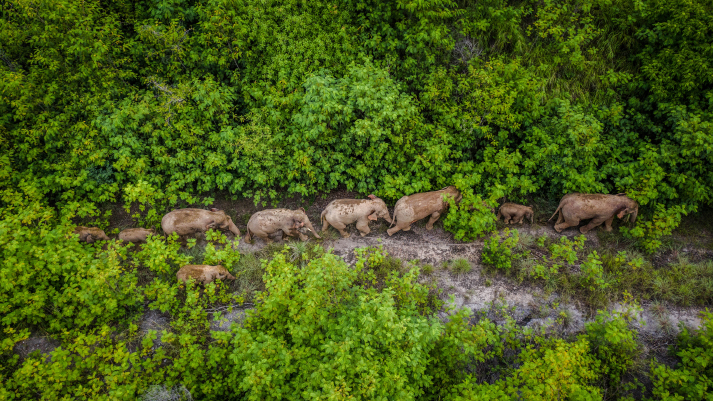| Lifestyle |
| A bridge of elephant protection | |
|
|
 A herd of wild Asian elephants in Yuxi, Yunnan Province, in August 2021 (XINHUA)
Home to large numbers of both wild and captive elephants, India's elephant protection laws are among the strictest in Asia. Elephants have been granted the highest level of legal protection for wildlife. Strict bans exist on poaching, trading and trafficking them, with hefty fines and prison sentences of up to seven years. China has been making efforts to protect its small population of elephants since the 1980s. Local authorities in areas with elephants such as Xishuangbanna Dai Autonomous Prefecture in Yunnan Province, have not only made efforts to relocate human populations away from elephant habitats but have also worked with private insurance companies to insure farmers' crops against damage caused by the animals. The 2016 amendment to China's Wildlife Protection Law of 1988 ensures that wildlife are provided with the necessary conditions for living, breeding, and healthcare, as well as protection against their mistreatment. According to a report by Xinhua News Agency, the population of elephants in China nearly doubled between the 1980s and 2021 to approximately 300. In 2020, a herd of 14 elephants trekked 500 km from their home in Xishuangbanna, on Yunnan's southern border, all the way to the outskirts of the provincial capital, Kunming. The journey baffled scientists and captivated a global audience, who followed the journey as the animals splashed in mud and napped together, as well as raiding crops and stealing food across the province. Asia has a long history of harmonious relations between humans and elephants. Elephants are revered in societies across Asia, specifically in India and China. As our big friends still remain vulnerable, how can the two Asian countries with great civilizations come together to save them? While both India and China have made concerted efforts to protect the elephant and some success has been achieved, danger still looms as conservation laws are often either flouted or not implemented. Strengthening domestic legislation is insufficient for the protection of elephants. The animals now face the much more dangerous threat of climate change, which calls for united action by these two leading economies, which are also rising Asian powers. There are many opportunities for cooperation between New Delhi and Beijing on elephant protection. These could potentially include: reaching an understanding with Myanmar and Bangladesh to coordinate management of elephant protection across borders; formation of a collaborative institute for research on elephant conservation; joint efforts on reforestation to ensure the expansion of buffer zones between animal populations and human settlements; the training of and provision of incentives to local populations that live near elephant habitats and possess traditional knowledge of harmonious living with elephants; formation of a joint resource fund to achieve set targets to increase the population of elephants through careful breeding and for building care facilities. China and India could also drive the establishment of a broader Asian multilateral organization that draws together governments, research institutes, nongovernmental organizations, local populations and environmental experts to carve out ecozones across Asia, where elephants can flourish in their natural habitats under the watchful eyes of conservation experts. By doing so, India and China would promote economic growth through an ecological path and responsible ecotourism in not just the two nations but in Asia at large. Such joint efforts would also act as a bridge to better relations between the two countries. The author is a postgraduate student of East Asian Studies at the University of Delhi Copyedited by G.P. Wilson Comments to dingying@cicgamericas.com |
|
||||||||||||||||||||||||||||
|